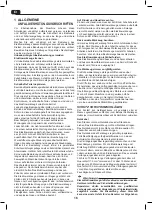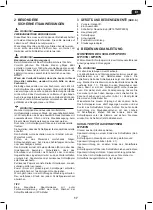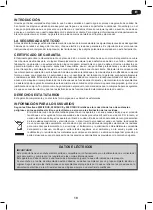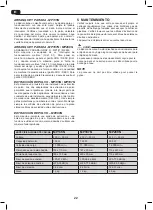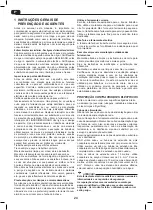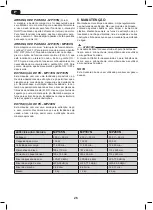
13
GB
2 SPECIFIC SAFETY INSTRUCTIONS
WARNING!
TWO HANDED OPERATION REQUIRED
This machine requires the use of two hands to ensure safe
operation and should not be used when working from
ladders and step ladders.
If the machine is to be used when working at height a
suitable, stable platform or scaffold tower with hand rails
and kick boards should be used.
WARNING!
Extreme Caution Required
Extreme care should be taken when sanding paint.
The dust residue may contain LEAD which is poisonous.
Any pre 1960 building may have paint containing lead
on wood or metal surfaces which has been covered with
additional layers of paint.
STOP!
If you suspect that paint on surfaces in your house
contains lead seek professional advice.
Lead based paints should only be removed by a professional
and should not be removed using a Sander. Once deposited
on surfaces, hand to mouth contact can result in the
ingestion of lead. Exposure to even low levels of lead can
cause irreversible brain and nervous system damage.
The young and unborn children are particularly vulnerable.
WARNING!
Some wood and wood type products especially MDF
(Medium Density Fibreboard) can produce dust that can be
hazardous to your health. We recommend the use of an
approved face mask with replaceable filters when using this
machine in addition to using the dust extraction facility.
Ensure that the holes in the sanding sheet align with the
holes in the machine sanding pad.
Ensure that the sanding sheet is securely retained under
the sanding sheet clamps and that the sanding sheet is
taught.
Do not start the machine whilst it is in contact with the work
piece.
Check the work piece for any protruding nails, screw heads
or anything that could tear or damage the sanding sheet.
Hold the machine correctly using two hands and adopt a
stable stance, make sure that the mains cable is prevented
from coming into contact with the machine or getting caught up
on other objects preventing completion of the sanding pass.
Replace the sanding sheet as soon as it becomes worn or
if it is torn. Torn sanding sheets can cause deep scratches
which are difficult to remove.
Always start sanding with coarse grade of sanding sheet
working through the grades to the finest grade.
Wherever possible always sand in the direction of the grain
and remove the sanding dust between each grade of
sanding sheet.
TIP
An acceptable filler which could be a good colour match can
be made by mixing the sanding dust with PVA glue.
3 COMPONENTS AND CONTROLS
(PIC. A
)
1
Front grip
2
On/Off trigger
3
Continuous running button (MP187N-MP280N)
4
Main grip
5
Sandpaper
6
Vibrating plate
7
Clamping device
8
Vacuum cleaner adapters
4 OPERATING INSTRUCTIONS
ATTACHING SANDPAPER
MP135N / MP187N
Select an abrasive paper with the correct grit corresponding
to the work to be carried out.
WARNING!
Always disconnect the machine from the power supply before
adjustment, changing accessories and maintenance.
The abrasive side of the paper faces outwards
from the base plate. Locate the clamps on either side of the
machine (Pic. 1.1). Push the clamp lever inwards to clear
the securing tag. The lever is under spring tension. Allow
the lever to raise upwards and then manoeuvre outwards
and downwards (Pic. 1.2). This allows the clamp to release
its grip on the sander base. Repeat the operation for other
side. Position one end of the sand paper under the clamp
and re-secure.
The sand paper should be pulled taught and follow the
contours of the Sander base. Ensure alignment of dust
extraction holes with the holes in the sandpaper sheets.
Position the other end of the sand paper under the clamp
and re-secure. The Sander is now ready for operation.
ATTACHING SANDPAPER
MP280N
Remove the plug from the mains supply.
Release the clamping mechanism at one end of the vibrating
plate (Pic. 2.1).
Insert the end of the sandpaper into the clamp and close the
clamping mechanism (Pic. 2.1).
Release the clamping mechanism at the other end of the
vibrating plate.
Draw the sandpaper tight over the vibrating plate and insert
the end of the sandpaper into the clamp and close the
clamping mechanism.
Ensure that the holes in the sandpaper are aligned with the
holes in the vibrating plate and adjust if necessary.
Summary of Contents for MP135N
Page 1: ......
Page 7: ...4 2 A 1 5 3 8 6 7 2 4 1 MP135N 2 4 1 1 1 2 2 1 MP135N MP187N MP280N ...
Page 8: ...5 3 MP280N MP135N MP187N 3 2 3 1 3 ...
Page 31: ...28 PL ...


















